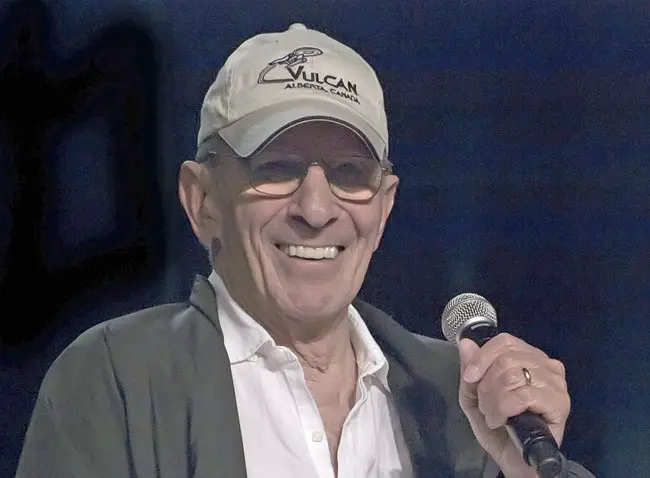
He may have borrowed his most famous line from Voltaire–“Vivez heureux, vivez longtemps,” the phiolosopher had written a friend in 1764–but Leonard Nimoy, the more cerebral, less bombastic and always cooler half of the Star Trek duo with William Shatner, made the phrase his own: “Live long, and prosper.”
 This morning (Feb. 27), Nimoy, 83, died in Los Angeles at his home from chronic obstructive pulmonary disease, which Nimoy last year said was the result of years of smoking, even though he’d quit three decades ago.
This morning (Feb. 27), Nimoy, 83, died in Los Angeles at his home from chronic obstructive pulmonary disease, which Nimoy last year said was the result of years of smoking, even though he’d quit three decades ago.
“His artistic pursuits — poetry, photography and music in addition to acting — ranged far beyond the United Federation of Planets,” The Times’s Virginia Heffernan wrote this morning, “but it was as Mr. Spock that Mr. Nimoy became a folk hero, bringing to life one of the most indelible characters of the last half century: a cerebral, unflappable, pointy-eared Vulcan with a signature salute and blessing: ‘Live long and prosper’ (from the Vulcan ‘Dif-tor heh smusma’).”
“It’s hard to think of another star that was so closely and affectionately identified with a single role,” Alessandra Stanley writes. “Mr. Shatner moved on; he even found a new screen buddy, James Spader, on ‘Boston Legal.’ Mr. Nimoy stayed in the game for a while, notably by playing Paris on “Mission Impossible” and doing a lot of theater, but he had a hard time finding roles that eclipsed the éclat of Spock. He turned to philanthropy and art, publishing poetry record albums and several books of poetry and photography, including a collection of nude portraits of overweight women, titled ‘The Full Body Project.’ little like Spock struggling between his two sides, Mr. Nimoy was torn between his real self and his ‘Star Trek’ identity, the one fans were so passionate to prolong.”
Writing very briefly about the show when it first aired on NBC in 1966 (in an 8:30 p.m. slot), a Times critic called it “TV’s first psychodrama in orbit,” and assured viewres, somewhat improbably–the Vietnam War’s body count was ramping up, as were the assassinations of America’s leaders–that the show “makes clear that life in space will probably be more traumatic than on earth.”





























Leave a Reply